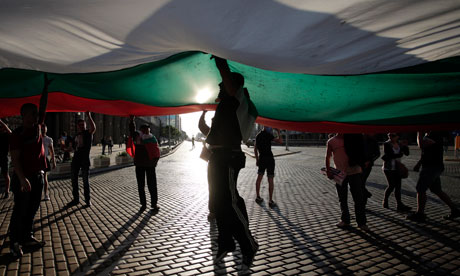The spirit of protest in Brazil and Turkey has now swept into Bulgaria
Tens of thousands of Bulgarians are voicing their anger over political corruption, abuse of power and economic hardship

Demonstrators carry a Bulgarian flag during a protest in Sofia in May 2013. Photograph: Valentina Petrova/AP
In recent weeks the world has been transfixed by protests in Turkey andBrazil. Fewer media outlets have reported on the anti-government protests in Bulgaria, now well into their second week. But make no mistake about it: Bulgaria is undergoing a profound crisis of representation.
Every night for more than a week up to 10,000 people have taken to the streets of Sofia, initially protesting against the appointment on 14 June of the media oligarch Delyan Peevski as Bulgaria's "security tsar", the head of the State Agency for National Security (Dans), the Bulgarian CIA.
Peevski, who is 32, comes from a well-connected family that owns Bulgaria's largest newspaper and television group (it controls 80% of print media in the country) and has no experience in the security sector. In 2007 he was sacked from his post as deputy minister and investigated for attempted blackmail. He is an MP for the ethnic Turkish party, the Movement for Rights and Freedoms (MRF), which supports the prime minister Plamen Oresharski's governing coalition, led by the Bulgarian Socialist party (BSP). His appointment took place without a debate in the National Assembly.
Dans is the agency responsible both for Bulgaria's internal and external security. Its role was elevated significantly in the wake of the terrorist attack on Burgas airport in July 2012 (attributed to Hezbollah) which killed five Israeli tourists and their Bulgarian bus driver. This executive role has been strengthened even further recently after controversial amendments in the Dans legislation were signed giving the organisation responsibility for dealing with organised crime.
Bulgarians are protesting against far-reaching and systematic corruption and the "capture" of the state by rent-seeking oligarchic networks. Oresharski was appointed by the BSP to head a so-called "expert" government, after a general election in April produced a tight outcome. The technocratic government came about because the leading figures within the two largest political parties, the BSP and the centre-right Gerb (Citizens for European Development of Bulgaria) were widely discredited. And although the prime minister has now withdrawn the appointment of Peevski, for protesters the episode suggested that even respected figures like Oresharski are incapable of shaking off the shadowy world of oligarchic power in Bulgaria.
In Bulgaria it is often impossible to know where organised crime ends and legitimate business begins. The nexus between the two is characterised by complex bureaucratic structures, opaque corporate accounting and a maze of offshore accounts. In Varna, Bulgaria's third largest city, the protests have taken direct aim at TIM, a business conglomerate allied to Gerb and long the real power in the region. Some estimates suggest that it controls up to 70% of Varna's economy, including most of the tourist infrastructure. When protesters in Varna yell "M-A-F-I-A" they are automatically collapsing business into politics and implicating local municipal officials as the agents of this powerful oligarchic network.
Varna perfectly illustrates why the current protests are largely non-party-policitical and anti-politics in tone: the definitive division in today's Bulgaria is no longer between right and left, but between the citizens and the mafia. This is a world where the guilty don't just go unpunished; they ascend to the highest citadels of power.
Although corruption and the abuse of power are the central themes of this protest, economic hardship also plays a role. New data from the EU demonstrates that Bulgarians have the lowest standard of living in the European Union, at around 50% of the EU average. Even Croatia, which will accede to the EU on 1 July, is significantly more prosperous than Bulgaria.
The irony here is not lost on Bulgarians. At the onset of the EU financial crisis in 2008, Bulgaria had one of the lowest levels of public debt in Europe at 15% of GDP. Its budget deficit was below 3%. And yet the government of Boyko Borissov embarked on a foolish programme of austerity measures, the logic of which was almost entirely predicated on demonstrating to Brussels what a good pupil Bulgaria now was. Reductions in public spending coupled with large increases in the price of electricity and other utilities brought people out on to the streets in February. But, like Turkey, what began as a protest against a specific appointment has quickly mutated into a general opposition to the government.
Oresharski also has to grapple with increasing ethnic tensions in the country. Many Bulgarians resent the influence of the junior coalition party, the MRF which represents mainly the Turkish minority (about 10% of the population). The far-right party Ataka, which won 23 seats and 7.3% of the vote in the recent parliamentary election, has sought to exploit this sentiment at every opportunity. Its leader, Volen Siderov, continues to stoke the flames of hatred against both the ethnic Turks and the Roma population.
A further destabilising element is the continued feuding between the leaders of Bulgaria's largest political parties. Last week, Borissov vowed to initiate a libel lawsuit against Sergei Stanishev, leader of the BSP and president of the Party of European Socialists, over claims by the latter that Borissov had a criminal record. The timing of all these developments could not be worse for Bulgaria as it comes under more and more scrutiny in the run-up to the June European council summit meeting.
The protesters, meanwhile, cherish the attenion. They want to re-enforce their message to Bulgaria's politicians: an end to vertiginous and voracious oligarchical power and the normalisation of Bulgarian politics
sourse
sourse

No comments:
Post a Comment